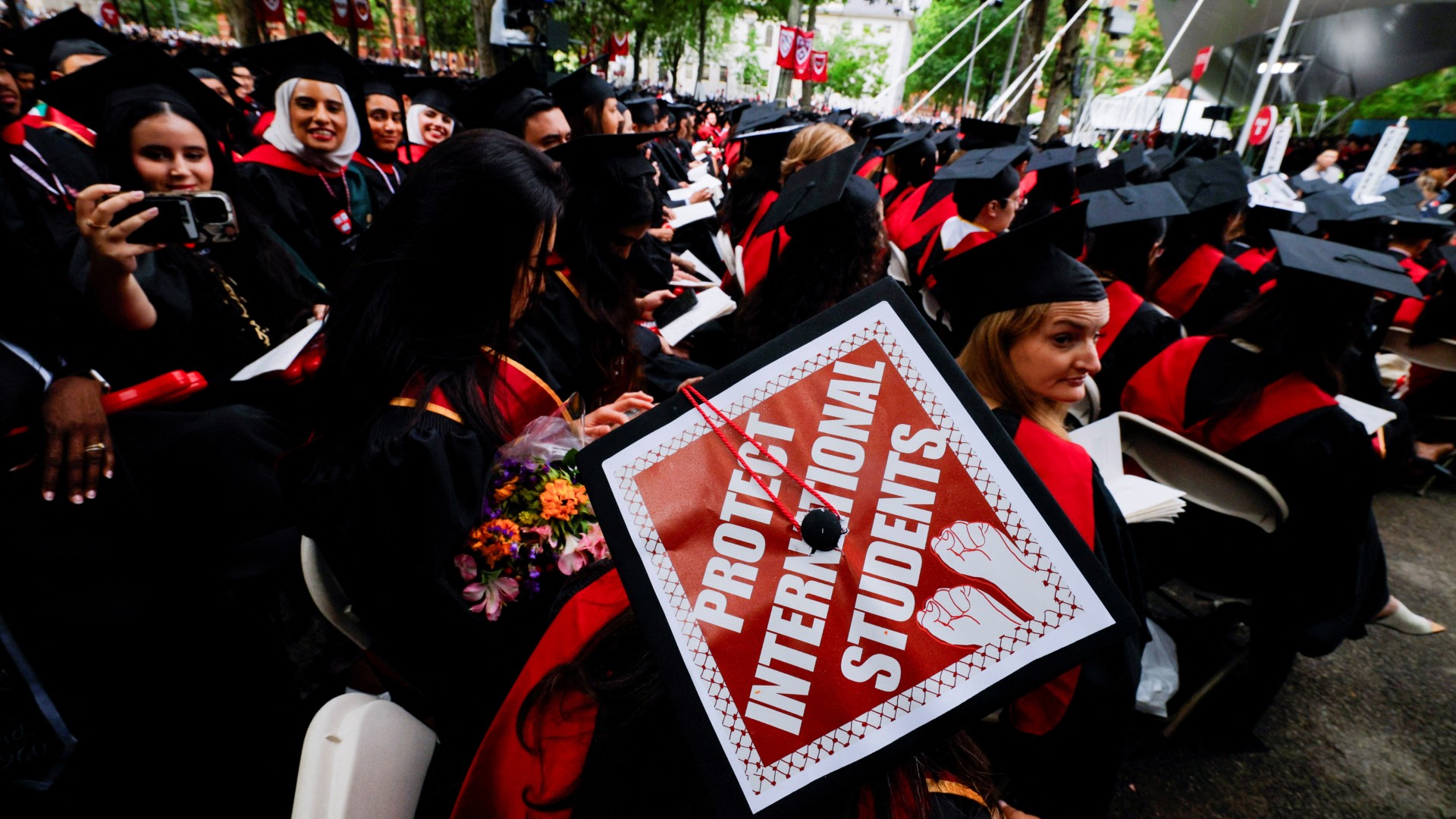Judge rules in favour of Harvard University keeping its international students

Harvard University on Thursday won a brief reprieve in its fight to continue enrolling international students after a federal judge upheld a block on a governmental order.
US district judge Allison Burroughs ruled to uphold the terms of a temporary restraining order (TRO), which froze the Department of Homeland Security's (DHS) revocation of the university’s student and exchange visitor programme (SEVP) certification programme, the process that enables universities to enrol foreigners, and preserved the status of international students.
The news came as Harvard’s Class of 2025 was assembling for commencement exercises. The order grants relief to around 7,000 international students - a quarter of Harvard’s student body - whose lives have been thrown into limbo over the last few weeks.
“Harvard will continue to take steps to protect the rights of our international students and scholars, members of our community who are vital to the University’s academic mission and community - and whose presence here benefits our country immeasurably,” Harvard said in a public statement about Thursday’s court decision.
Burroughs indicated that she will issue a longer-term hold while litigation continues. This would enable international students, staff, and faculty to continue to study and work at the Ivy League school. The TRO will stay in place until a broader injunction is agreed upon. The next hearing has yet to be scheduled.
New MEE newsletter: Jerusalem Dispatch
Sign up to get the latest insights and analysis on Israel-Palestine, alongside Turkey Unpacked and other MEE newsletters
Last Thursday, DHS told Harvard that its international students must either transfer to other institutions or face deportation, as its continued fight for academic autonomy faced another round of repercussions from the Trump administration.
Harvard sued in response, and last Friday, a judge temporarily blocked the DHS’s revocation of the university’s SEVP programme.
Trump hits back
Meanwhile, US consulates and embassies were instructed on Friday to comb the social media accounts of Harvard visa applicants for any traces of antisemitism, in what the State Department is calling a pilot programme that could be rolled out at other colleges across the country.
A cable sent out and signed by Secretary of State Marco Rubio late on Thursday, and obtained and first reported on by POLITICO, says consular officers should undertake “a complete screening of the online presence of any nonimmigrant visa applicant seeking to travel to Harvard University for any purpose”.
While the policy will largely impact students, it will also include faculty members, researchers, staff members and guest speakers at Harvard. The Trump administration suspended new appointments for student visa applicants on Tuesday because it was considering expanding social media vetting of all foreign students applying to US colleges.
Increased social media vetting already existed but was previously used for existing students who may have participated in protests against Israel’s war on Gaza.
Trump administration backtracks
Before the SEVP revocation, the Trump administration appeared to waver on its initial decertification, potentially on procedural grounds.
The Department of Homeland Security said on Thursday it would now give Harvard University a 30-day response time to prove it meets the requirements of the SEVP programme.
After 30 days, the DHS could still revoke Harvard’s SEVP certification if it still claims that Harvard broke the law, unless a preliminary injunction is granted.
The New York Times reported last week that the administration is poised to cut all remaining federal contracts with Harvard, which are estimated to be worth $100m.
The two sides have been in a legal war for months now.
The US State Department and DHS began cracking down on any pro-Palestinian sentiment expressed by student visa holders in the US after the nationwide campus protests in 2024 in support of Gaza.
At the end of March, the Trump administration announced it was reviewing $9bn in federal funds and grants to Harvard. It said it would review more than $255.6m in current contracts and $8.7bn in grants spread over multiple years.
The administration accused the university of failing to adequately protect Jewish students on campus from antisemitic discrimination and harassment, in violation of Title VI of the Civil Rights Act of 1964.
On 3 April, the Trump administration sent an initial list of demands to “right these wrongs”, as part of its crackdown on what it calls antisemitism on campuses across the US, referring to the widespread campus protests against Israel's war on Gaza.
Then, on 11 April, the Federal Task Force to Combat Antisemitism sent Harvard an expanded list of demands.
Harvard rejected the government’s demands, which included reporting foreign students for code violations, reforming its governance and leadership, discontinuing its diversity, equity, and inclusion programmes, and changing its hiring and admission policies, especially for international students.
In response to the list of demands, the institution took a stand against the Trump administration, saying in a letter, issued by Emanuel Urquhart & Sullivan LLP and King & Spalding LLP, that “The university will not surrender its independence or relinquish its constitutional rights”.
In response, the Trump administration hit Harvard with a $2.3bn federal funding freeze, which represents 35.9 percent of Harvard's $6.4bn operating expenses.
Then, the US Department of Health and Human Services said that it was terminating $60m in federal grants to the university, saying it failed to address antisemitic harassment and ethnic discrimination on campus.
The Cambridge, Massachusetts-based institution has said it “cannot absorb the entire cost” of the frozen grants, and that it was working with researchers to help them find alternative funding. It is also suing the Trump administration over its decision to cut grants.
The Federal Task Force to Combat Antisemitism is made up of four government agencies, including the Department of Justice, the Department of Health and Human Services, the Department of Education, and the US General Services Administration.
The task force was set up in February following Trump’s executive order, Additional Measures to Combat Anti-Semitism, signed at the end of January.
middleeasteye.net